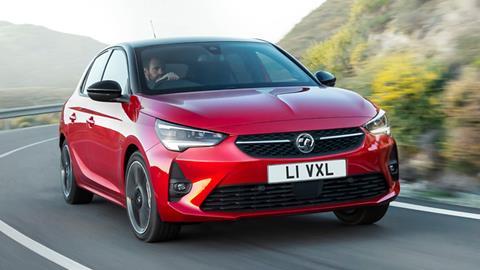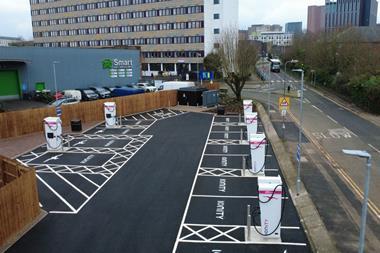
UK new car registrations fell by 15.8% to 119,167 units in April, according to the latest figures from the Society of Motor Manufacturers and Traders (SMMT).
Showrooms were open for the entire month, unlike 2021 when lockdown restrictions were in place until 12 April, but the SMMT said global supply chain shortages, of which semiconductors are the most notable, have continued to constrain the delivery of new vehicles.
Battery electric vehicles (BEVs) registrations continued to grow with 12,899 in April, an increase of 40.9% on the same month last year, and taking a 10.8% market share compared with 6.5% last year. Registrations of hybrids (HEVs) also rose by 18.3%, but the number of new plug-in hybrid (PHEV) registrations decreased by a third (32.8%). As a result, electrified vehicles comprised 27.9% of all new car registrations during April.
Diesel car sales continued to plummet, and were down 52% on the same month a year ago at 6,725, giving a market share of 5.6%. Petrol car sales were down 23.3% at 54,633, but still accounted for nearly half of all sales with a market share of 45.8%.
Taking into account supply chain constraints and broader macro-economic factors, SMMT has revised its market outlook for 2022, with 1.72 million new cars new cars now expected to be registered during the year, down from the 1.89 million outlook in January.
The outlook for plug-in vehicles was also downgraded with the forecast for BEV registrations now at 289,000 units, down from 307,000, and PHEVs at 144,000, down from 163,000. HEVs also saw their outlook fall from 198,000 to 193,000. This means that plug-in electric cars are now expected to account for a quarter of all registrations (25.2%) during the year, with BEVs comprising around one in six new cars on the road.
SMMT chief executive Mike Hawes said: “The worldwide semiconductor shortage continues to drag down the market, with global geopolitical issues threatening to undermine both supply and demand in the coming months. Manufacturers are doing everything they can to deliver the latest low- and zero-emission vehicles, and those considering purchase should look to place their orders now to benefit from incentives, low interest rates and reduced running costs.
“Accelerating the transformation of the new car market and the carbon savings demanded of road transport in such difficult times requires not just the resolution of supply issues, however, but a broader package of measures that encourages customer demand and addresses obstacles, the biggest of which remains charging anxiety.”
Sue Robinson, chief executive of the National Franchised Dealers Association (NFDA), which represents franchised car and commercial vehicle retailers in the UK, said: “Demand is being dampened by the cost of living pressures. NFDA’s state of the market survey reveals cost of living increases are the most concerning factor for franchised dealers, followed by ongoing supply constraints.
“Buying a new vehicle tends to be the second largest purchase in the life of a consumer, after their house. Therefore, franchised dealers are working extremely hard with the customer to ensure quality of service and customer care at a time when inflationary pressures are beginning to impact decision making.
“It is also of note that sales of electrified vehicles continue to perform very strongly as brands introduce new models. Franchised dealers that have Electric Vehicle Approved (EVA) accreditation are extremely well placed to advise customers on what is the best new vehicle for them.”

































No comments yet